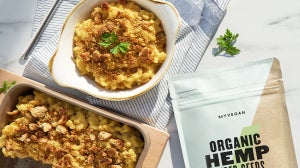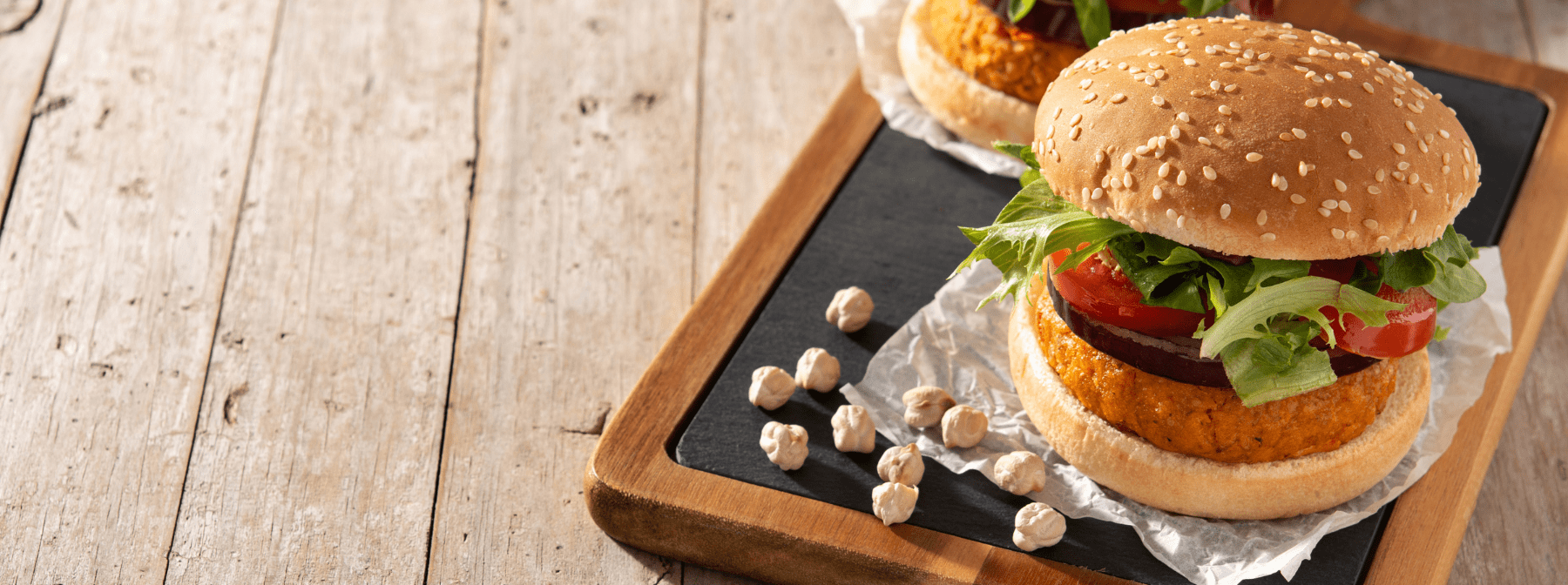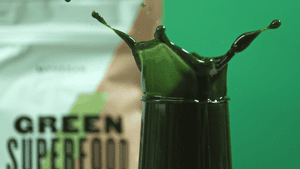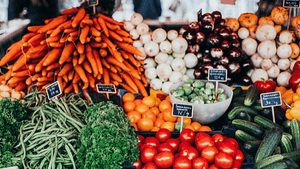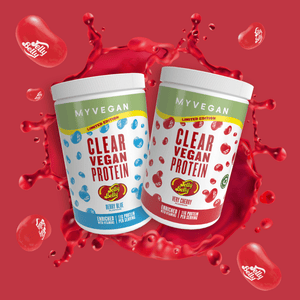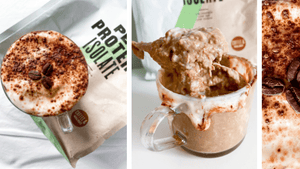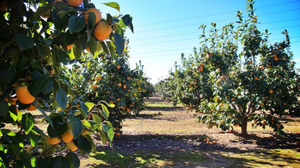
Being vegan doesn’t mean you need to say bye to burgers. Check out our recipe for a high protein, high satisfaction pea protein burger.
Made from blended chickpeas and infused with our signature Pea Protein Isolate, these Pea Protein Burgers are a must-have for your midweek menu. Budget-friendly, full of flavour and super simple to make, we’ve crafted the perfect recipe to help you get that much-needed burger fix in a matter of minutes.
Our Pea Protein Burgers are made with fragrant cumin powder, sharp and zesty lemon and are complete with crunchy lettuce and cucumber. Check out the recipe below for a healthy, high protein burger recipe that you can make your own.
What Is Pea Protein?
Usually made from split peas, pea protein is one of the highest quality plant-proteins on the market because it contains all essential amino acids. Pea protein is a well-balanced protein that is low in fat and high in fibre and, if you opt for Pea Protein Isolate, it can be a great way to get a low calorie, high protein hit.
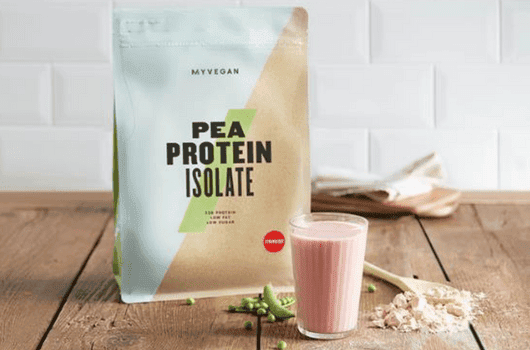
Want to find out more about the nutritional profile of pea protein? Check out the blog below by our Nutritionist:
Maria's Salted Caramel Pretzel Smores Bars | No Bake
This Salted Caramel Protein Smores Bar recipe will help you make the perfect protein snack. Are you ready to create your new snack-time staple?
Pea Protein Burger Recipe
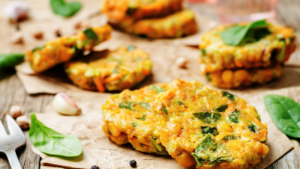
Nutritional Information
Serves 4, nutritional information based per serving.
344kcal
8g fat
1g saturates
56g carbs
6g sugar
6g fibre
20g protein
1.3g salt
Ingredients
400g can of chickpeas, drained
Zest of x1 lemon, juice of ½
1 tsp ground cumin
1 tbsp Pea Protein Isolate (unflavoured)
Bunch of coriander, chopped
100g breadcrumbs
X1 medium red onion, ½ diced, ½ sliced
1 tbsp olive oil
4 buns of your choosing
1 large tomato, sliced
½ cucumber sliced
Chili sauce and vegan mayo to serve
Method
Using a food processor or blender, whizz the chickpeas, lemon zest and juice, cumin, half the coriander, Pea Protein Isolate and seasoning of your choice.
Once blended, tip into a bowl and combine with 80g of breadcrumbs and diced onions until the consistency becomes firmer and dough-like.
Shape 4 burgers and pat the remaining 20g of breadcrumbs on either side of the burger and place into the fridge to chill for around 10-30 minutes.
Heat the oil in a frying pan until hot. Fry the burgers for 4 minutes either side on a medium heat.
Once cooked, slice each bun and fill with a slice of tomato, red onion, cucumber, coriander and your sauce of choice.
Top Tips
Tip 1:
To get the perfect shaped burger, roll the mixture into golf-ball-sized balls with your hands and flatten them down onto your chopping board.
Tip 2:
Make sure your oil is extra hot before placing the burgers in the pan- it'll give them an extra sizzle & a delicious, charred effect.
Tip 3:
If you’re just cooking for one, place the remaining patties into freezer bags and freeze for a quick & easy lunch on another day.
Additions And Variations
Addition 1:
If you enjoy a spicy hit, try adding some chopped red chilis to your patty for that extra hot hit!
Addition 2:
Try caramelising your onions before you add them to the patty mixture for a delicious, sweet flavour.
Addition 3:
Level up your buns to plant-based brioche and enjoy a restaurant-quality dinner!
Addition 4:
Make your burgers even better by using a burger press instead of using your hands.
Addition 5:
If you’re a cheese lover, melt some vegan cheese over your patties while they’re still frying.
Looking for another burger which offers an equally-high protein hit? Try our recipe for Hemp Burgers below:
Storage Instructions
Refrigerate
If you’re going to make these Pea Protein burgers again and have leftover mixture, place the patties in the fridge and cover.
Freeze
If you aren’t going to cook the burgers again for another few days, cover the patties and freeze.
Reheat
When reheating your burgers from the fridge, simply cook in a frying pan with some oil. When reheating from frozen, allow the patties to defrost slightly at room temperature then reheat in a frying pan with some oil until cooked through.
Take Home Message
Made with chickpeas and Pea Protein Isolate, this Pea Protein Burger is the tastiest way to increase your protein intake. You can make this burger your own by topping it with any of your go-to toppings and adding different seasons or spices.
If you love this recipe, why not try making this:
FAQs
Is pea protein healthy?
Pea protein is a well-balanced protein that is low in fat and high in fibre and, if you opt for Pea Protein Isolate, it can be a great way to get a low calorie, high protein hit.
Are plant-based burgers better for you than beef?
While beef burgers do contain a higher value of essential amino acids, plant-based burgers are an excellent source of fibre, folates, and additional micronutrients.
That being said, it’s important to identify what your personal health goals and preferences are. For a protein intake that is more complete, ensure you’re consuming a wide variety of plant protein sources.
How do you get bean burgers to stick together?
Without using egg, it can be difficult to get your pea protein burger to stick together, so we’ve come up with a list of tips to help you out:
Remove any excess water & make sure your patties are dry: this can help hold the mixture together.
Add extra breadcrumbs to firm up the mixture.
Refrigerate your patties for over 30 mins: if you’re worried about the patties falling apart, placing them in the fridge for longer can help to firm them up.
Make your patties thick: the thicker the patty, the more likely it is to stay together while frying.
Does pea protein cause bloating?
No. Generally, pea protein is very easily digested by the body and causes very few side effects. Should you find yourself experiencing any unwanted side effects, simply switch to another protein alternative.

Related Articles
